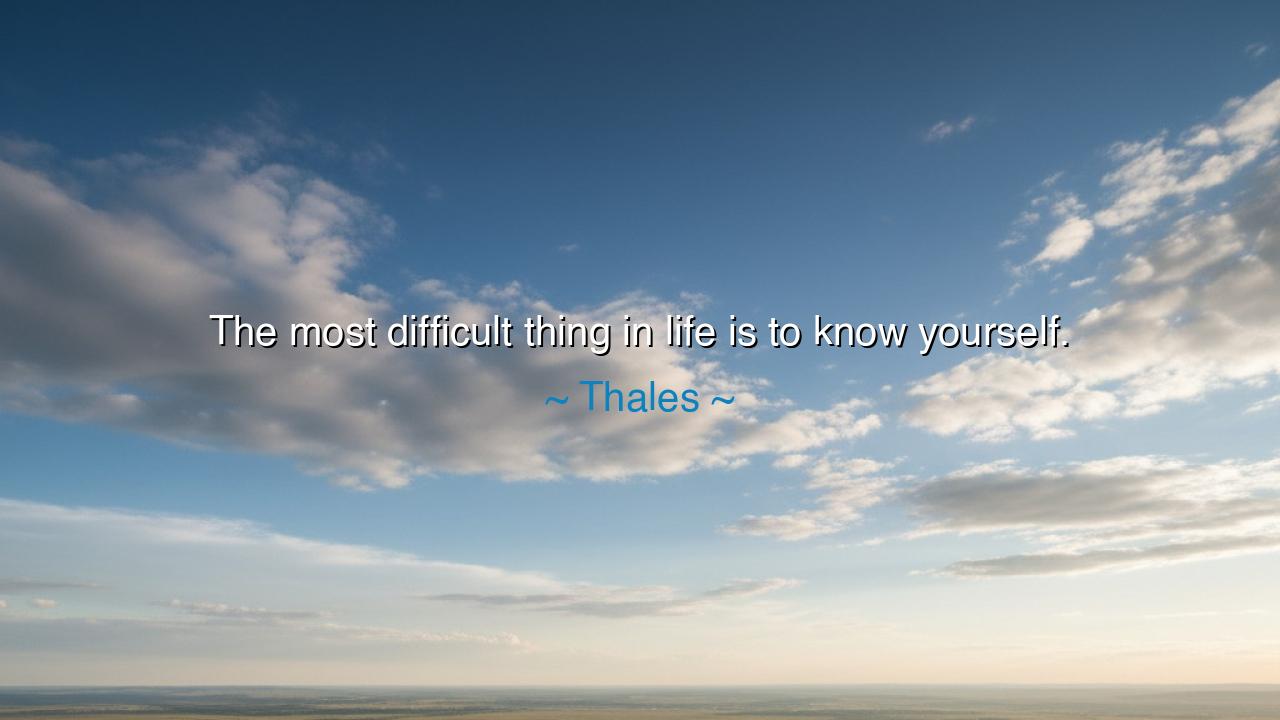
The most difficult thing in life is to know yourself.






"The most difficult thing in life is to know yourself." These timeless words from Thales, one of the Seven Sages of ancient Greece, hold a deep and profound truth. Thales' statement points to the inner struggle of self-awareness and the difficulty inherent in truly understanding one’s nature, desires, and purpose. While it may seem easy to look outward and observe the world around us, the journey to know oneself is fraught with complexities, distractions, and often, a deep sense of uncertainty. To know ourselves is to confront not only our strengths but also our fears, flaws, and limitations, a task that is as daunting as it is essential.
The origin of Thales' wisdom can be traced to the ancient Greek tradition of philosophy, where self-knowledge was considered the highest pursuit. The great philosophers, like Socrates, built their entire teachings around the concept of self-examination. Socrates famously stated, "Know thyself," which, in many ways, is an extension of what Thales imparted. To truly understand the world, Socrates believed, one must first understand their own mind, their motivations, and their beliefs. The deepest truths, Socrates argued, arise not from external observation, but from deep introspection. The foundation of wisdom is not in the accumulation of knowledge, but in knowing who you are and recognizing the limitations of your own understanding.
Consider the story of Socrates himself, a man who spent much of his life questioning not only others but also himself. He wandered the streets of Athens, engaging in dialogue with anyone who would listen, always seeking to peel back the layers of ignorance and reveal deeper truths. Socrates, however, was not merely interested in abstract concepts — he aimed to uncover the truths of human nature. By questioning his own assumptions and beliefs, he sought to better understand his own character and, by extension, the very nature of virtue and truth. Socrates' example shows that self-awareness is a process, a journey of constant reflection and questioning, and this is what makes the pursuit of self-knowledge so difficult.
In the Hindu tradition, the path of self-awareness is also a central theme. The Bhagavad Gita, one of the oldest and most revered texts, speaks of self-realization as the key to spiritual enlightenment. The hero Arjuna, on the battlefield, faces not only external enemies but also his own inner turmoil and confusion. It is only through understanding his dharma, his true self, that he can find clarity in the chaos of life. The Gita teaches that, much like Thales suggests, true peace and wisdom come when one transcends external distractions and turns inward, seeking to align oneself with their higher purpose. In this way, self-knowledge is not simply an intellectual exercise but a spiritual journey that requires great discipline, humility, and courage.
Consider also the life of Leonardo da Vinci, a genius whose curiosity and genius were matched only by his relentless quest for self-understanding. Da Vinci was not content to simply study the world around him; he sought to understand his own mind and his place within the cosmos. His numerous notebooks, filled with reflections on his own thoughts and processes, demonstrate his constant effort to learn more about himself and the world. Da Vinci’s insatiable desire for knowledge, paired with his continuous self-exploration, made him one of the most profound thinkers in history. His life is an embodiment of the idea that the pursuit of self-knowledge is a never-ending endeavor, one that continually shapes how we engage with the world.
The lesson Thales imparts is that true wisdom begins with understanding the self. Self-awareness is not just about recognizing one’s strengths but also accepting one’s weaknesses and imperfections. The difficulty in knowing ourselves lies in the complexity of our own minds, the conflicting desires, and the fear of confronting the parts of ourselves that are uncomfortable or painful. Yet, it is precisely through this honest reflection and introspection that we grow, not only as individuals but as a collective society. To know yourself is to recognize your true nature, to see beyond the masks we wear, and to embrace the fullness of our human experience.
To walk the path of self-knowledge, we must cultivate the practice of mindfulness, reflection, and self-inquiry. Begin by setting aside time for solitude, where you can engage with your own thoughts without distraction. Ask yourself difficult questions, and be willing to sit with the answers that arise, even if they challenge your preconceptions. Socrates and Arjuna both found their wisdom through this process of inner inquiry, and so too must we. The more we understand our motivations, our values, and our fears, the more we can act with clarity, purpose, and integrity. Life may be full of confusion, but by seeking to know ourselves, we bring light to the shadows that cloud our path, and the journey toward wisdom becomes clearer.
Thus, to embrace the wisdom of Thales, we must recognize that the most important and challenging task of our lives is to know ourselves. This is not a task to be completed in a single moment, but a lifelong journey of self-exploration. Only when we look inward and understand our own nature, free from the distractions of the world, can we truly understand the world around us. Let us walk this path with courage, knowing that the pursuit of self-knowledge is the foundation upon which all other wisdom is built.






AAdministratorAdministrator
Welcome, honored guests. Please leave a comment, we will respond soon